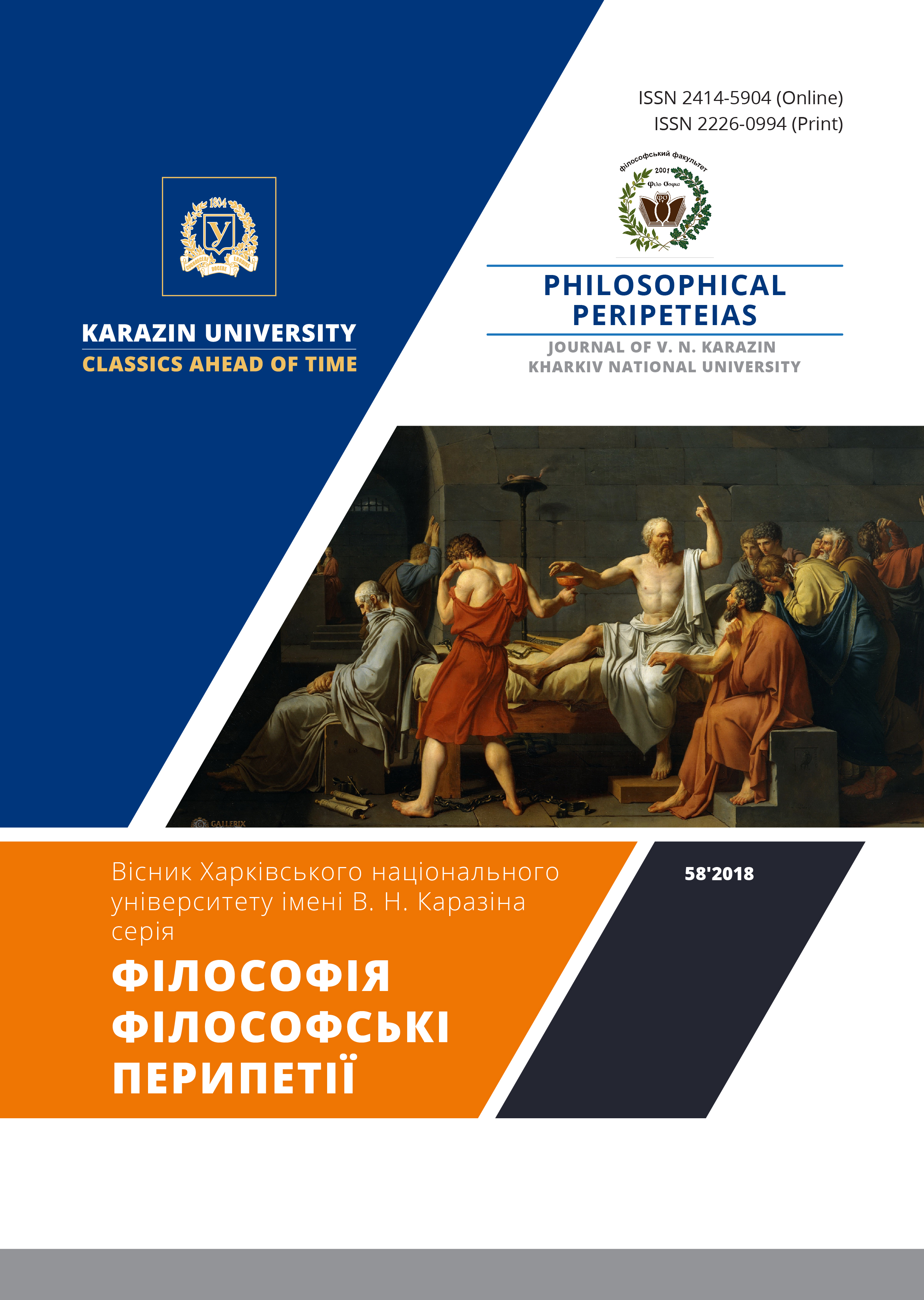МАРКСИЗМ: НАРИСИ З ІСТОРІЇ СТАНОВЛЕННЯ «РЕЦЕПЦІЙНОГО ПОЛЯ» ПОЛІТИЧНОЇ ОНТОЛОГІЇ ГЕҐЕЛЯ
Анотація
В межах запропонованого дослідження авторка виклала та проаналізувала низку ідей, що стосуються становлення марксистського «рецепційного» поля як провідного напряму еволюції інтерпретаційного корпусу епохи «після Геґеля». Наочно підкреслюючи залежність марксової теорії від теорії Геґеля, нарис оголює геґелівський матеріал, що був долучений К. Марксом та його послідовниками до формування матеріалістичного погляду на розвиток людської історії, а також підготував тотальне розповсюдження гіпотези про непотрібність концепту Абсолюта в якості головного елемента філософування нового типу.
Завантаження
Посилання
/Посилання
Avineri, S. (1974). Hegel’s Theory of the Modern State. Cambridge: Cambridge University Press.
Avineri, S. (1970). The Social and Political Thought of Karl Marx. Cambridge: Cambridge University Press.
Dale, E. (2017). Hegel, the End of History, and the Future. Cambridge: Cambridge University Press.
Dickey, L. (1990). Religion, Economics, and the Politics of Spirit, 1770–1807. Cambridge: Cambridge University Press.
Ferrarin, A. (2017). Hegel and Aristotle. Cambridge: Cambridge University Press.
Gottlieb, G. (2016). Fichte’s Foundations of Natural Right. A Critical Guide. Cambridge: Cambridge University Press.
Haym, R. (2006). Hegel and his time. (P. L. Solyanikov, Trans.). Saint Petersburg: Nauka. (In Russian).
Hegel, G. W. F. (1978). Political works. Moscow: Nauka. (In Russian).
Hegel, G. W. F. (1990). Philosophy of right (Vol. 1–2). Moscow: Mysl’. (In Russian).
Hegel, G. W. F. (2000). The Phenomenology of Spirit. (G. G. Shpet, Trans.). Moscow: Nauka. (In Russian).
Korsch, К. (1923). Marxism and Philosophy. Retrieved from http://scepsis.net/library/id_672.html. (In Russian).
Moggach, D. (2011). The New Hegelians Politics and Philosophy in the Hegelian. Cambridge: Cambridge University Press.
Patočka, J. (2001). Heretical Essays in the Philosophy of History. (B. Marusik, Trans.). (Original work published 1975). Kyiv: Osnovy. (In Ukrainian).
Pinkard, T. (1996). Hegels phenomenology sociality reason. Cambridge: Cambridge University Press.
Pippin, R. B. (2008). Hegel’s practical philosophy. Rational Agency as Ethical Life. Cambridge: Cambridge University Press.
Schaap, S. (2012). Farewell to the Almighty. Revaluation of ethical life. (I. Lozovyi, Trans.). Kyiv: Zupansky Publishing House. (In Ukrainian).
Schmitt, C. (2000). Political theology: a collection of works. (A. Filippov, Trans.). Moscow: CANON-press-C. (In Russian).
Shanks, A. (2008). Hegel’s Political Theology. Cambridge: Cambridge University Press.
Toews, J. (1985). Hegelianism The Path Toward Dialectical Humanism, 1805–1841. Cambridge: Cambridge University Press.
Weil, E. (2009). Hegel and the state. Five reports. (V. Yu. Bystrov, Trans.). (Original work published 1975). Saint Petersburg: Vladimir Dahl. (In Russian).
Wood, A. (1993). Hegel and Marxism. In F. C. Beiser (Ed.), The Cambridge companion to Hegel (pp. 414–445). Cambridge: Cambridge University Press.
Вейль Э. Гегель и государство. Пять докладов / пер. с франц. В. Ю. Быстрова. СПб.: Владимир Даль, 2009. 282 с.
Гайм Р. Гегель и его время / пер. с нем. П. Л. Соляникова. СПб.: Наука, 2006. 392 с.
Гегель Г. В. Ф. Политические произведения / пер. с нем. М.: Наука, 1978. 437 с.
Гегель Г. В. Ф. Феноменологией духа / пер. с нем. Г. Г. Шпета. М.: Наука, 2000. 495 с.
Гегель Г. В. Ф. Философия права / пер. с нем. М.: Мысль, 1990. T. 1, 2. 524 с.
Корш К. Марксизм и философия [Электронный ресурс] / пер. с нем. URL: http://scepsis.net/library/id_672.html.
Паточка Я. Єретичні есе про філософію історії / пер. з чеськ. Б. Марусик. К.: Основи, 2001. 374 с.
Шаап С. Прощання із Всемогутнім. Переоцінка етичного життя / пер. с англ. І. Лозовий. К.: Видавництво Жупанського, 2012. 294 с.
Шмитт К. Политическая теология: сборник работ / пер. с нем., заключит. статья и составление А. Филиппова. М.: КАНОН-пресс-Ц, 2000. 416 с.
Avineri S. Hegel’s Theory of the Modern State. Cambridge: Cambridge University Press, 1974. 268 р.
Avineri S. The Social and Political Thought of Karl Marx. Cambridge: Cambridge University Press, 1970. 280 р.
Dale E. Hegel, the End of History, and the Future. Cambridge: Cambridge University Press, 2017. 270 р.
Dickey L. Religion, Economics, and the Politics of Spirit, 1770-1807. Cambridge: Cambridge University Press, 1990. 476 р.
Ferrarin A. Hegel and Aristotle. Cambridge: Cambridge University Press, 2017. 468 р.
Gottlieb G. Fichte’s Foundations of Natural Right. A Critical Guide. Cambridge: Cambridge University Press, 2016. 288 р.
Moggach D. The New Hegelians Politics and Philosophy in the Hegelian. Cambridge: Cambridge University Press, 2011. 360 р.
Pinkard T. Hegels phenomenology sociality reason. Cambridge: Cambridge University Press, 1996. 464 р.
Pippin R. B. Hegel’s practical philosophy. Rational Agency as Ethical Life. Cambridge: Cambridge University Press, 2008. 308 р.
Shanks A. Hegel’s Political Theology. Cambridge: Cambridge University Press, 2008. 252 р.
Toews J. Hegelianism The Path Toward Dialectical Humanism, 1805–1841. Cambridge: Cambridge University Press, 1985. 464 р.
Wood A. Hegel and Marxism. In F. C. Beiser (Ed.), The Cambridge companion to Hegel (pp. 414–445). Cambridge: Cambridge University Press, 1993. 522 р.
Автори, які публікуються у цьому журналі, погоджуються з наступними умовами:
- Автори залишають за собою право на авторство своєї роботи та передають журналу право першої публікації цієї роботи на умовах ліцензії Creative Commons Attribution License 4.0 International (CC BY 4.0), котра дозволяє іншим особам вільно розповсюджувати опубліковану роботу з обов'язковим посиланням на авторів оригінальної роботи та першу публікацію роботи у цьому журналі.
- Автори мають право укладати самостійні додаткові угоди щодо неексклюзивного розповсюдження роботи у тому вигляді, в якому вона була опублікована цим журналом (наприклад, розміщувати роботу в електронному сховищі установи або публікувати у складі монографії), за умови збереження посилання на першу публікацію роботи у цьому журналі.
- Політика журналу дозволяє і заохочує розміщення авторами в мережі Інтернет (наприклад, у сховищах установ або на особистих веб-сайтах) рукопису роботи, як до подання цього рукопису до редакції, так і під час його редакційного опрацювання, оскільки це сприяє виникненню продуктивної наукової дискусії та позитивно позначається на оперативності та динаміці цитування опублікованої роботи (див. The Effect of Open Access).






3.gif)




